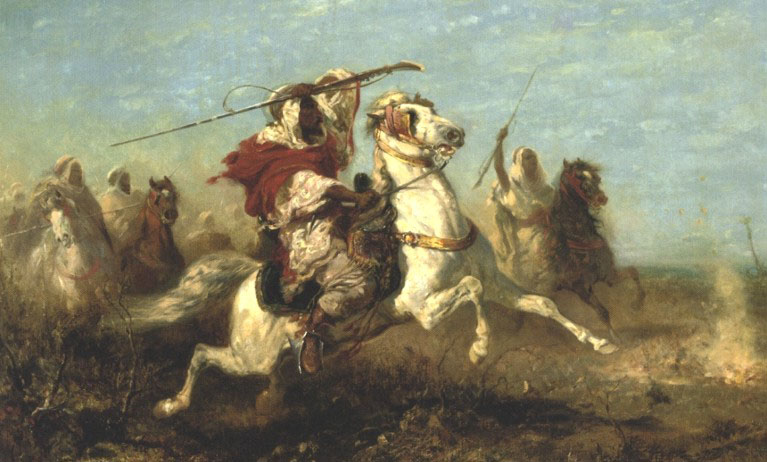
Studying history, as we have mentioned elsewhere,[1] through the stages of public education for young people has a great impact on shaping their minds. This critical skill constitutes a cognitive immunization against the diseases of extremism, absolutism, hatred, arrogance, and delusory vanity.
THE QUESTION we must pose here is this: Do we teach our Islamic history to our youth according to an objective, critical perspective? In my view – and I hope that I am wrong in this – most Islamic history curricula in our Arab education systems are taught to young people according to two approaches
1) A focus on political history: That is, the history of the caliphs, rulers, and heroic leaders, their wars, conquests, victories, glories, and exploits, all the while obscuring and neglecting the role of common people in forging these achievements. As a result our history has turned into a history of the lives of kings and heroes, not the history of the people who lived in these societies, contributed to events, faced and overcame its challenges. This means that the social history of Arab societies hardly attracts any attention in the academic curricula. Instead these magnify the role of the heroic individual, and marginalize the role of the peoples who are the authors of the events. We should therefore not be surprised at the fondness of our peoples for the symbolic leader who challenges the West, America and Israel, even if by doing so he tyrannizes them and tramples over their dignity, violates their freedoms, and leads them to defeat. Similarly, it is scarcely to be wondered at that our populations are still waiting for the long-delayed arrival of the expected Mahdī – the ‘Guided One’ (by God) – who will fill the earth with justice, given that they are incapable of resolving the contradiction with the Almighty’s saying:
“Lo! Allah changeth not the condition of a folk until they (first) change that which is in their hearts” [1]
2) A glorifying tendency concerning the past: We teach Islamic history to our youth according to a perspective that glorifies the past and its symbols and personalities. In this perspective disadvantages and grievances are passed over in silence, while merits and exploits are highlighted. History becomes studied via a selective approach, showing in a history that spans 14 centuries only its illuminating moments, while a full thousand years, those punctuated by bloody conflicts, are absent – years of raw power politics, the suppression of opposition, massacres and copious acts of Muslim bloodletting, and long drawn out sectarian, tribal and ethnic armed conflicts.
The Umayyads, for instance, did not hesitate to attack the Kaʽba itself using catapults, something which the pre-Islamic Arabs did not dare to do. They also crucified Ibn al-Zubayr, an act that is religiously prohibited, and they equally dared to slay the son of the Messenger’s daughter, Imam Al-Hussein, whose family they abused. They also violated the city of the Messenger and the Abbasids followed suit, as did the Ottomans after them. All of these form a series of dark deeds, one after the other, deeds that scholastic history simply passes over in silence, without lending them even a critical glance.
Our history, as taught to our students, spotlights the words “Wā Muʽtasimāh!”[2] of the woman crying for help yet has nothing to say about the humiliation of the dignity of the downtrodden and marginalized Muslim who was flogged, and from whom tax was forcibly exacted so that the caliph may enjoy the comforts of his palace. School history books are proud of what Harūn al-Rashīd said to the cloud passing over his palace: “Rain wherever you want, and your tax will come to me”, in indicate the breadth of the Islamic empire. They do not mention anything about the blood that was spilled getting this tax to the caliph!

Suggested Reading
To fill the minds of the youth with the glories of their nation is a legitimate enough purpose, but what about the viewpoint of the peoples conquered by those triumphant Arabs? And what about the injustices inflicted upon them?! Why undervalue the historical rights of other peoples?
Our historiography focuses on the mistakes of others and their various plots against Muslims. But what about our mistakes towards them? Our history is not something sacred, it is the history of human beings who make mistakes and errors, people who are not free from whims and illusions; we must therefore teach it according to a critical vision, one that seeks to derive benefit from its lessons and to avoid repeating its mistakes. The glorification approach to the past has merely craned our youth’s necks back towards romantic dreams which seek to restore this past, along with its political system, the caliphate.
[1] See Almuslih article:Islamic history is the shaper of the Arab mind.
[2] Qur’ān XIII (Al-Raʽd), 11.
[3] ‘Wā Muʽtaṣimāh’, according to some traditional accounts, was the cry of a Muslim woman who had sought the help of the Caliph Al-Muʽtaṣim against the Byzantines, in response to which Al-Muʽtaṣim directed his forces to her rescue. It became a symbol for those who seek someone’s help. (Ed.)
